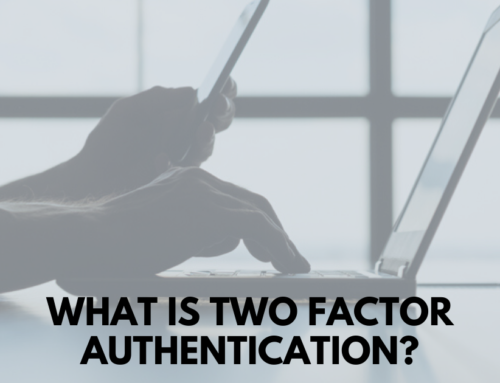Do you know how to keep yourself secure? You may have a firewall and antivirus installed, but have you considered a password manager? What about security awareness training? Or a VPN?
Check out the 8 tips below to learn what you may not already know about cybersecurity.
When everything is going well, the last thing you want to do is think about what will happen when something goes wrong.
We don’t have to dwell on the potential for a security disaster though – you know that it’s a possibility, so let’s just leave it at that. What’s important about this is that you know to cover your bases.
No need to assume the worst – just plan for it, so you know you’re covered.
The fact is that the cybercrime business has never been bigger – it’s estimated that the global cybercrime industry will cause up to $6 trillion in damages in just a few years.
You don’t need to be told how important something like cybersecurity is – it’s obvious after all. Everyone knows the consequences of unsecured business technology.
However, your cybersecurity may not be up to snuff. Not because you don’t think it’s important, but because you have other things on your mind.
Check out these 8 security tips from cyber security companies in Chicago:
Protect Yourself With The Right Tech
Your firewall is your first line of defense for keeping your information safe.
A firewall is a particular type of solution that maintains the security of your network. It blocks unauthorized users from gaining access to your data. Firewalls are deployed via hardware, software, or a combination of the two.
A firewall inspects and filters incoming and outgoing data in the following ways:
- With Packet Filtering that filters incoming and outgoing data and accepts or rejects it depending on your predefined rules.
- Via an Application Gateway that applies security to applications like Telnet (a software program that can access remote computers and terminals over the Internet, or a TCP/IP computer network) and File Transfer Protocol Servers.
- By using a Circuit-Level Gateway when a connection such as a Transmission Control Protocol is made, and small pieces called packets are transported.
- With Proxy Servers: Proxy servers mask your true network address and capture every message that enters or leaves your network.
- Using Stateful Inspection or Dynamic Packet Filtering to compare a packet’s critical data parts. These are compared to a trusted information database to decide if the information is authorized.
Verify Your Disaster Recovery & Business Continuity.
You must have a backup copy of your data if it’s stolen or accidentally deleted.
Develop a Business Continuity & Disaster Recovery policy that specifies…
- What data is backed up
- How often it’s backed up
- Where it’s stored
- Who has access to the backups
Backup to both an external drive in your office and a remote, secure, online data center. Set backups to occur automatically. And make sure your backup systems are encrypted.
Train Your Staff.
Your staff can have a significant effect on your cyber security – either they know enough to keep your assets secure, or they don’t, and therefore present a serious threat to your security.
So, which is it? Do your employees and volunteers have the knowledge they need to spot cybercrime scams, avoid common pitfalls and keep your data secure?
If you’re not sure, then they may need training…
What Is Cyber Security Training?
Security awareness training helps your employees and volunteers know how to recognize and avoid being victimized by phishing emails and scam websites.
They learn how to handle security incidents when they occur. If your employees and volunteers are informed about what to watch for, how to block attempts and where they can turn for help, this alone is worth the investment.
How Do I Train My Employees For Cyber Security?
A comprehensive cybersecurity training program will teach your staff how to handle a range of potential situations:
- How to identify and address suspicious emails, phishing attempts, social engineering tactics, and more.
- How to use business technology without exposing data and other assets to external threats by accident.
- How to respond when you suspect that an attack is occurring or has occurred.
How Much Does Security Awareness Training Cost?
The cost to train your staff on effective cybersecurity practices can vary depending on a number of factors – primarily, the extent of the training:
- Basic (free): This type of training is likely a single day event, like a seminar or lunch conference. It may be held by a local Chicago IT company, and may very well be free for attendees. It’s cost and time-effective, but again, it will only go so deep. You may learn a bit about phishing and other popular scams, but there probably won’t be any interactive exercises.
- Advanced (<$30): This level includes major branded cybersecurity training programs, like KnowBe4, one of the most popular training programs in the country. This is a tried and tested curriculum, that includes interactive training modules, with tests and drills. It’s an undoubtedly more effective training program, but it won’t be free. Based on a range of per-seat prices, for the largest companies it can cost $16/seat, and for the smaller groups, up to $30/seat. This can also be facilitated by the right Chicago IT company.
- Certified (<$10,000): This last level likely isn’t what you’re looking for, but of course, it all depends on what you want. If you have an internal IT staff and personnel responsible for cybersecurity, this may be worth it for you. These courses can last multiple weeks and are based out of local colleges, institutions, or via online programs. They’re certified by big names and provide a thorough education in cybersecurity practices and technologies. These are the kinds of courses that those working in the IT industry take. That’s why they aren’t cheap – per person, these courses cost thousands of dollars.
Manage Your Passwords.
Passwords remain a go-to tool for protecting your data, applications, and workstations.
They also remain a common cybersecurity weakness because of the careless way employees go about trying to remember their login information. Weak passwords are easy to compromise, and if that’s all that stands between your data in the cloud and in applications, you could be at serious risk for a catastrophic breach.
Unfortunately, many users often opt for a weak password that’s easy to remember, rather than a strong one they’ll forget.
The good news is that there is a way to get the best of both worlds.
One of the best ways to maintain complex passwords is with a password manager. Password managers are the key to keeping your passwords secure.
A password manager generates, keeps track of and retrieves complex and long passwords for you to protect your vital online information. It also remembers your PINS, credit card numbers and three-digit CVV codes if you choose this option.
Plus, it provides answers to security questions for you. All of this is done with strong encryption that makes it difficult for hackers to decipher.
The most popular Password Manager available today is likely LastPass. This solution consistently ranks high against its competitors‘ thanks to its free, premium and family versions, a range of features, and pedigree of quality. More than 13.5 million people and 43,000 businesses use LastPass and its range of features:
- This manager creates long, randomized passwords that protect against hacking
- It will sync your passwords with all of your devices, including your smartphone
- This will save you time when shopping online by completing forms with my address and phone number
- It also provides two-factor authentication using your mobile device
- Storage for unlimited logins
- Automatic form completion
- Biometrics (finger and thumbprint reading) for access
Keep Your Tech Patched And Up To Date.
Did you know that one of the most common ways that cybercriminals get into a network is through loopholes in popular software, applications, and programs?
Despite how advanced modern software is, it is still designed by humans, and the fact is that humans make mistakes. Due to this, much of the software you rely on to get work done every day could have flaws — or “exploits” — that leave you vulnerable to security breaches.
Many of the most common malware and viruses used by cybercriminals today are based on exploiting those programming flaws; to address this, developers regularly release software patches and updates to fix those flaws and protect the users.
This is why it’s imperative that you keep your applications and systems up to date.
Unfortunately, most users find updates to be tedious and time-consuming and often opt to just click “Remind Me Later” instead of sitting through an often-inconvenient update process.
Comprehensive and regular patch management is a crucial part of proper IT security. Some of the worst data breaches are based on “zero-day exploits”, which are based on exploits found by hackers but not by the developers, leading to severe security risks and an immediate need for patching.
Use A VPN.
One of the most proven techniques to make sure your data is safe is to use a virtual private network (VPN), which will give you back control over how you’re identified online. A VPN creates a secure tunnel for your data to transit the Internet, using a network of private servers.
When you use a VPN, your data is encrypted, or hidden, as it moves from your device to the VPN and then continues onto the Internet through what’s called an exit node. A VPN creates the appearance that your data is coming from the VPN server, not from your device.
That makes it harder for an attacker to identify you as the source of the data – no matter whether you’re on your mobile device’s data connection, or using an unsecured retail Wi-Fi network while you’re in line for coffee. Even if attackers can intercept your data, the encryption means the attackers can’t understand your data or use it to their advantage.
When you put your data out to the VPN server, it exits back out to the public internet. If the site you’re visiting has HTTPS to keep the connection safe, you are still secure.
Keep Healthcare Organizations Secure
Beyond the conventional business world, if you operate in the healthcare sector, it’s even more important for you to stay secure.
Why Is Cybersecurity Important In Healthcare?
The fact is that cybersecurity in healthcare IT is more difficult than other sectors.
It requires a lot of data sharing with a lot of different people, more so than in other sectors. It exists on more different devices in more dispersed settings. The complexity and breadth of health IT systems have increased.
There are complex and ever-evolving government standards that can be hard to understand but must be complied with, and the data being dealt with has a high market value and a high negative impact on individuals if it becomes compromised.
Remember Wanna Cry? The infamous ransomware struck a few years ago, encrypting the data of thousands of businesses in the UK (including the entirety of the National Health Service) and holding them to ransom. By the end of the weekend, Wanna Cry had infected thousands of networks in over 150 countries around the world.
What Is Healthcare Cybersecurity?
It all comes down to the HIPAA Security Rule.
The Security Rule sets standards for the handling of electronic Protected Health Information (ePHI), which is the specific type of data the HIPAA Privacy Rule covers. This rule establishes national standards for properly securing patient data that is stored or transmitted electronically.
The rule requires that three different types of safeguards are put in place:
- Administrative
- Physical
- Technical
The purpose of these safeguards is to ensure the security of ePHI as it is transported, maintained, or received. Essentially, the Security Rule is meant to allow for new technology to be integrated into your operations uninterrupted while still keeping private patient data protected.
By law, the Security Rule applies to health plans, healthcare clearinghouses, and any other healthcare provider that handles any sort of health information electronically. Any provider or entity that comes in contact with ePHI must comply with the HIPAA Security Rule – if that includes you, then make sure you follow it!
Consider Local Cyber Security Companies In Chicago
When you’re not sure if you have the skills or knowledge to get the job done, what can you do? Consult with cybersecurity professionals.
What Do Cyber Security Professionals Do?
The cyber security professional’s job is to manage your cyber security, simple as that. Instead of needing an employee or internal team to keep your tech and data secure, you let someone else with the skills and knowledge do it for you:
- Cyber security professionals perform regular vulnerability testing as per industry standards to ensure you aren’t dealing with overlooked cyber security weaknesses.
- Cyber security professionals help you plan and achieve a secure environment to work in.
- Cyber security professionals provide ongoing service and support for any security-related concerns you may have.
Like this article? Check out the following blogs to learn more:
3 Reasons to Regularly Test Business Systems






